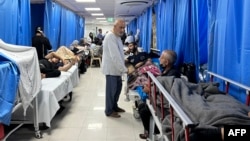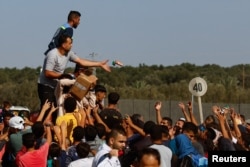U.N. agencies say the humanitarian crisis in Gaza is deepening as civilian deaths mount, the killing of United Nations aid workers reaches unprecedented levels, entire neighborhoods are leveled under relentless bombing, and millions of people are unable to receive the food, water, and medicine needed to survive.
“If there is a hell on Earth today, its name is northern Gaza. People who remain there, the corners of their existence are death, deprivation, despair, displacement and literally darkness,” said Jens Laerke, spokesperson for the Office for the Coordination of Humanitarian Affairs.
“The entire Gaza Strip has been plunged into darkness since the 11th of October, when the electricity grid was shut down and fuel stopped entering,” he said Friday.
Israeli forces imposed a total blockade on Gaza after Hamas fighters based in the territory launched a large-scale attack in southern Israel on October 7, killing at least 1,400 people.
Hamas also took about 240 hostages during the attack and continues to fire rockets into Israeli territory.
While Israel partially lifted its siege of Gaza on October 21, it has refused to allow fuel to enter the territory, arguing that Hamas would divert it for military purposes.
The United States reports that Israel has agreed to a daily four-hour humanitarian pause to allow civilians to flee northern Gaza for safer places in the south and to let truckloads of badly needed aid enter the enclave.
Laerke said it will be impossible in four hours to bring enough aid into Gaza through the Rafah crossing, which he said was “designed and built for a pedestrian crossing. It is not built for trucks.”
“The crossing that is used and that was built for trucks passing is the Kerem Shalom crossing … so that is why we are advocating with the authorities in Israel to reopen and use that crossing,” he said.
He noted that on Thursday 65 trucks carrying food, medicines and other relief crossed from Egypt into Gaza via the Rafah crossing, bringing the total number of trucks to have entered Gaza since October 21 to 821.
Before the current hostilities, he said, about 500 truckloads of aid entered Gaza every working day. Now, he said, “It is difficult for aid workers, for us to get in, for trucks to get in. And secondly, southern Gaza is not safe. It is not safe.”
The World Health Organization agrees. It reports that 20 of the 36 hospitals in Gaza are no longer functioning and that the 16 that continue to operate are providing only the bare minimum of services.
“They do not have the adequate supplies. They do not have the anesthetic medications. They do not have the disinfectants, and they are massively, massively overcrowded,” said Margaret Harris, WHO spokesperson.
“We are ready to send emergency medical teams into Gaza to support the health system but there is no safe access. Nowhere is safe,” she said. “Look at the huge numbers of UNRWA [UN Relief and Works Agency for Palestine Refugees] colleagues that have been killed.”
UNRWA says more than 100 of its staffers have been killed.
“This is unprecedented. The number of staff killed in such a short period of time is unprecedented in the history of the U.N.,” said Rolando Gomez, chief of press and external relations in Geneva.
Volker Türk, U.N. high commissioner for human rights, called the deaths of the UNRWA staff members “outrageous and deeply heartbreaking.”
Türk spoke Friday about the situation in Israel and the Palestinian territories at a news conference in Amman at the end of his mission to Egypt and Jordan.
“It is clear that enduring peace and security cannot be delivered by the exercise of fury and pain against people who have no responsibility for the crimes that were committed,” he said.
“The atrocious attacks by Hamas against Israel on 7 October should outrage each and every one of us. There needs to be justice, accountability and remedy for the victims of these atrocious crimes. The hostages need to be brought back home and indiscriminate firing of rockets into Israel needs to cease,” he added.
Türk also said that the extensive Israeli bombardment of Gaza in densely populated areas was “clearly having a devastating humanitarian and human rights impact” and Israel must immediately end the use of such methods and means of warfare.
He said strikes on hospitals and in the vicinity of hospitals in Gaza City have been particularly intense, noting that international humanitarian law clearly states that medical units must be protected and respected at all times.
“Any use by Palestinian armed groups of civilians and civilian objects to shield themselves from attack is in contravention of the laws of war,” he said.
“But such conduct by Palestinian armed groups does not absolve Israel of its obligation to ensure that civilians are spared,” he said, adding, “It is absolutely clear that civilians are protected under international law wherever they are.”






